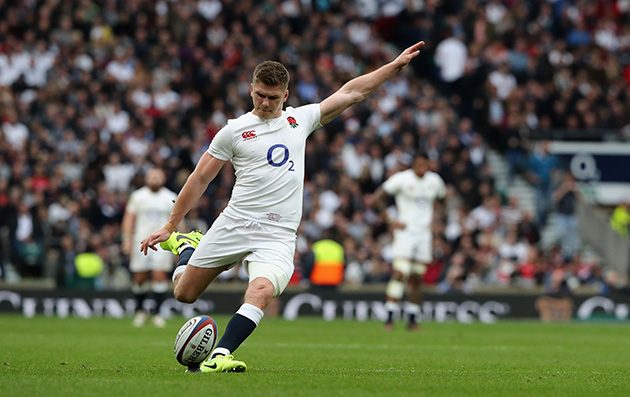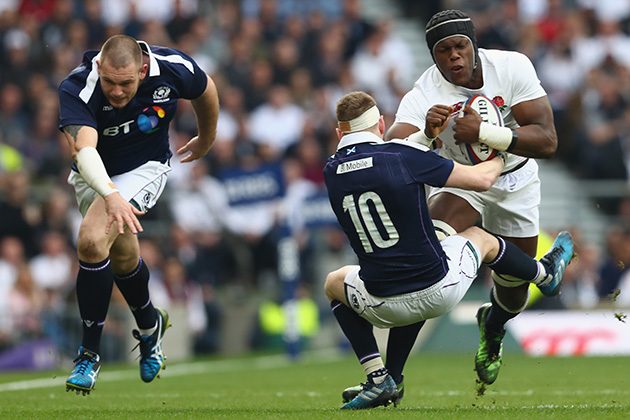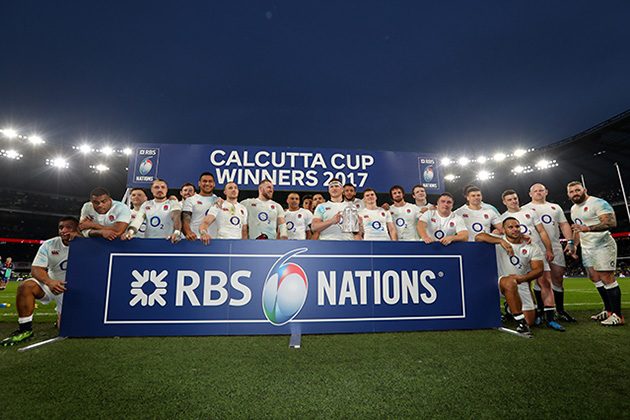We rate the players who set the 18-Test winning runs for England and the All Blacks
England equalled New Zealand’s record for the most consecutive Test wins by a Tier One nation when beating Scotland in the Six Nations. But which team is better?
Looking at the stats over the two runs, the All Blacks’ figures are more impressive: 751 points scored, including 104 tries, and 253 conceded, which is around just 14 a game. England have notched 72 tries and 621 points while conceding 300 in their 18 wins.
Rugby World decided to do something a little different, however, so we have compared and contrasted the players who started the decisive 18th International victory for each team – the Calcutta Cup win for England and the victory over Australia in October 2016 for the ABs – and picked who would make a composite XV. Will you agree with our choices in this England v New Zealand debate?
Mike Brown v Ben Smith
There is no doubting Brown’s passion or commitment and he’s become something of an immovable object at full-back for England since 2013. He’s solid under the high ball and shows a willingness to counter-attack from deep – but the major flaw in his game is his reluctance to pass. He will often choose to take the ball into contact rather than pass to a team-mate, leading to missed opportunities.

First 15: Ben Smith breaks clear against Australia. Photo: Getty Images
In contrast, Smith is a creator. He may be mocked by team-mates for his pale skin but his attacking play is bright and vivid. He is consistent in his performances – when he knocked on against Wales in a Test last June, one journalist quipped that it was the first mistake he’d made in three years! – but is unpredictable with ball in hand and has the vision to put himself or team-mates into space. Pure class.
Winner: Ben Smith
Jack Nowell v Israel Dagg
This is a tough one. Dagg’s poor form meant he wasn’t selected for RWC 2015 and he admitted he wasn’t enjoying his rugby. An injury-enforced break meant he returned last year reinvigorated and playing some of his best rugby – he scored ten tries in 12 Tests in 2016.

Chief purpose: Jack Nowell scores his second try against Italy. Photo: Getty Images
Nowell, too, has had his injury woes but his work-rate is what sets him apart. He doesn’t stand on his wing waiting for the ball; his blue scrum cap pops up all over the pitch and he is a brilliant defender. It’s his industry that sees the Exeter Chief edge this particular battle.
Winner: Jack Nowell
Jonathan Joseph v Anton Lienert-Brown
The Englishman is the more experienced of the pair and showed with his hat-trick against Scotland what a dangerous player he is. He has fabulous footwork and a lot of pace, as well as an intuitive understanding with George Ford, but his form has been a little up and down over the past six months.

Centre points: Jonathan Joseph en route to one of his three tries v Scotland. Photo: Getty Images
Lienert-Brown made his All Blacks debut last August and did well, his distribution and support play particularly noteworthy. He was unfazed by the pressure of replacing such a class act as Conrad Smith at outside-centre and slotted into the All Blacks back-line with ease, but does he have the same ability of Joseph to produce a match-winning moment? Perhaps not. At least not yet.
Winner: Jonathan Joseph
Owen Farrell v Ryan Crotty
Had Manu Tuilagi been fit when Eddie Jones took charge of England, he may never have looked at the Ford-Farrell 10-12 partnership. Yet it has proved so effective it’s hard to see it changing any time soon.

Kicking king: Owen Farrell is England’s second highest point-scorer of all time. Photo: Getty Images
Farrell is a crucial cog in this England team. His goalkicking (bar the blip against Italy!) is unerring – he’s slotted 259 points for England in their 18 wins, more than 200 ahead of the next highest scorer, Jonathan Joseph (55) – and the team also benefit from his pinpoint distribution and boot in open play.
Crotty, like Lienert-Brown, is overshadowed somewhat by his predecessor, Ma’a Nonu. He’s a solid player but is nowhere near as pivotal to the All Blacks’ game as Farrell is to England’s – for that reason the Saracen gets the nod.
Winner: Owen Farrell
Elliot Daly v Julian Savea
Daly’s impact on the Scotland game was limited given that he was replaced early having been on the receiving end of a dangerous tackle by Fraser Brown, but he had been England’s outstanding back in the championship up to that point. There’s the high work-rate, the pace, the vision – and that huge left boot. And the centre has been playing out of position on the wing.

All smiles: Julian Savea runs in one of his 45 Test tries for New Zealand. Photo: Getty Images
Could anyone keep Savea out of a combined team though? He might not have been as prolific as usual in 2016 but his try-scoring rate cannot be ignored. He’s now notched 45 in 52 Tests and is so hard to stop he terrifies any defence.
Winner: Julian Savea
George Ford v Beauden Barrett
These two are from the same school of fly-halves – visionary, risk-takers, exciting to watch. They both see opportunity where others see none and have the ability to delight crowds with their innovative and bold play. Ford is thriving alongside Farrell while Barrett has grown in confidence since taking the No 10 shirt from Aaron Cruden last June.

Skip to it: Beauden Barrett tests Argentina’s defence. Photo: Getty Images
A tight call but the reigning World Player of the Year, with his consistently high attacking standards and ability to change a game with kicks and flicks, is favoured.
Winner: Beauden Barrett
Ben Youngs v TJ Perenara
The Leicester Tiger has fallen short of the levels he hit in the autumn series during this Six Nations, but he still has a balanced skill-set. Good game management, great box-kicker, the eye for a gap – not to mention those dummies he threw last autumn.

Passion player: TJ Perenara leads the haka in Chicago. Photo: Getty Images
Perenara is more of a livewire who looks to snipe around the breakdown, but he can also control a game and is a smart operator. He has the ability to up the tempo of a game when necessary, too, which would suit this combined back-line.
Winner: TJ Perenara
Joe Marler v Joe Moody
Both these men are big characters off the pitch, known for their sense of humour. Moody was called into the 2015 World Cup squad as an injury replacement for Tony Woodcock, ended up starting the final and has retained the No 1 jersey since New Zealand lifted the trophy at that tournament.

Power surge: Joe Marler takes on Jonny Gray during the Six Nations. Photo: Getty Images
Marler won his 50th cap against Scotland and has impressed both at scrum time and in the loose during the championship, keeping Mako Vunipola on the bench. Either of those Englishmen would get into this combined XV ahead of Moody, not only because of their experience but because of their impact with ball in hand.
Winner: Joe Marler
Dylan Hartley v Dane Coles
Hartley is revered by his coaches and team-mates for his leadership qualities. His lineout work against the Scots was pinpoint and he contributes a lot in the tight – but he is often withdrawn early in the second half as Jamie George offers more around the park.

Full stretch: Dane Coles crosses for a try against the Wallabies. Photo: Getty Images
Coles, in contrast, is an all-action hooker and often finds himself in open spaces for the All Blacks, showing skills and pace more recognisable in a back. He doesn’t neglect his set-piece duties either and must have pushed Beauden Barrett close in the race to be World Rugby Player of the Year in 2016.
Winner: Dane Coles
Dan Cole v Owen Franks
Cole is a mainstay for England – he’s been in the international set-up since 2010, won 76 caps (73 for England and three for the Lions) and is the only player to have started all 18 of the Tests in this run. Solid in the scrum, he also gets stuck in at the contact area, but he does have a tendency to give away penalties.

Thirsty work: Owen Franks drinks from the Bledisloe Cup. Photo: Getty Images
Franks is the All Blacks’ rock at tighthead and has won back-to-back World Cups. Not as showy as some other All Black front-towers but a reliable workhorse regarded as the best tighthead in the world by many experts.
Winner: Owen Franks
Joe Launchbury v Brodie Retallick
World Rugby Player of the Year in 2014, Retallick is something of a benchmark for modern-day locks. The 25-year-old excels at the basics – lineout, scrum, breakdown – but stands out for his work in open play, surging through defences and upfield with strong carries and showing surprisingly deft hands for a big man.

Decision time: Brodie Retallick weighs up his options against France. Photo: Getty Images
Launchbury has been England’s best forward in this Six Nations – Man of the Match against Wales and Italy, he was also to the fore in the Calcutta Cup game. He gets through a huge amount of work and is particularly adept at winning turnovers, or at least slowing down opposition ball.
This is a tight call but Retallick’s importance to the All Blacks was shown by his absence against Ireland in Chicago, when their winning run was brought to an end.
Winner: Brodie Retallick
Courtney Lawes v Sam Whitelock
Two athletic locks who have been involved in their international set-ups since 2009 and 2010 respectively. Whitelock has been the more consistent of the two, missing only ten of New Zealand’s 94 Tests since his debut against Ireland. He’s seen as a leader in this All Blacks squad and is a great lineout operator.

Rising high: Courtney Lawes rules at the lineout. Photo: Getty Images
Lawes has been more up and down, his momentum often stalled by injuries. He was expected to become something of an enforcer in the England engine room but has started less than half their matches since he came onto the scene. However, in this championship he has excelled – dominating the lineout, producing his trademark big hits and switching to the back row at scrum time as needed.
Winner: Courtney Lawes
Maro Itoje v Jerome Kaino
This is a case of the new star against the wily veteran. Kaino was one of the All Blacks’ standout performers in their 2011 World Cup win, went to play in Japan for a couple of years, returned to New Zealand and won back his place in the national side, playing a key role in their 2015 triumph too.

Hard running: Maro Itoje runs into Scotland’s Finn Russell. Photo: Getty Images
Such has been Itoje’s impact at senior level for club and country that it is easy to forget that he made his Test debut only 13 months ago. He seems to rise to every occasion and in this championship has been playing at blindside given England’s injuries in the back row, albeit that he has been packing down in the second row at scrum time.
Both are rounded players but Itoje’s continuing upward trajectory puts him in front.
Winner: Maro Itoje
James Haskell v Matt Todd
In 2016 Sam Cane was generally chosen to fill the No 7 shirt worn for so long by double World Cup-winning captain Richie McCaw in the No 7 shirt while many Kiwis felt Ardie Savea should be start at openside, but it was Crusader Todd who was picked for the decisive 18th Test win over Australia with Cane ruled out by injury. Todd’s Test opportunities have been limited over the years and they are likely to remain so with Cane and Savea above him in the pecking order.

Red alert: James Haskell on a burst against Italy. Photo: Getty Images
Haskell is England’s longest server having made his debut ten years ago but he’s played his best rugby under Eddie Jones. The combination of Chris Robshaw and Haskell at six and seven in 2016 was key for England, and Haskell has returned from injury in this tournament to become a key force once again. He’s not an openside in the traditional sense but his work-rate and mentality in defence stand out.
Winner: James Haskell
Nathan Hughes v Kieran Read
It’s fair to say Hughes has not made the same impact at Test level as he has for Wasps, defences closing him down quickly so he is unable to make his half-breaks and offload to those in support – the hallmark of his game.
Read is regarded as one of the best players in the world in any position. In fact, former England fly-half Stuart Barnes wrote in Rugby World last year that only All Blacks scrum-half Aaron Smith was better than him.

Leading man: Kieran Read with a back-handed offload v South Africa. Photo: Getty Images
Last year Read had less opportunity to showcase his talents in attack and had Billy Vunipola started against Scotland there would have been more debate over this position for the Saracen invariably gets over the gain-line and is vital to this England team’s game plan. As he was on the bench, Read is in – and captain of our combined XV.
Winner: Kieran Read
For the latest Rugby World subscription offers, click here.





